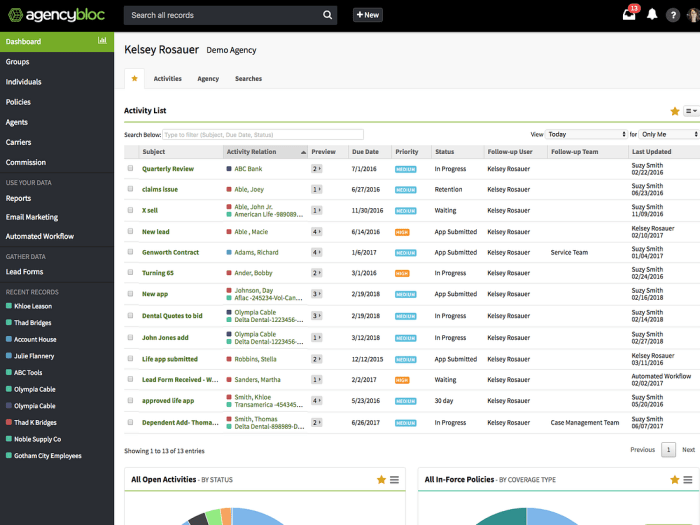Finding the right Customer Relationship Management (CRM) software is crucial for insurance agencies of all sizes. A robust CRM system streamlines operations, improves client relationships, and ultimately boosts profitability. This detailed guide explores the best insurance CRM software options available, considering factors like features, pricing, integrations, and user experience. We’ll delve into specific software, helping you make an informed decision for your agency’s needs.
Key Features to Look for in Insurance CRM Software
Before diving into specific products, let’s Artikel the essential features to consider when choosing an insurance CRM. The ideal system will seamlessly integrate into your existing workflows and enhance your agency’s efficiency.
Essential Features:
- Contact Management: Robust contact management is paramount. The system should allow for detailed client profiles, including policy information, communication history, and personal details. Look for features like customizable fields, segmentation capabilities, and easy import/export options.
- Policy Management: Efficiently track policy details, renewal dates, and claims information. Integration with your policy administration system is a significant advantage.
- Sales Pipeline Management: Visualize and manage your sales process, tracking leads, opportunities, and conversions. This helps identify bottlenecks and optimize sales strategies. Look for features like lead scoring and automated workflows.
- Communication Tools: Integrated communication tools, including email marketing, SMS messaging, and call logging, are essential for maintaining consistent contact with clients.
- Reporting and Analytics: Comprehensive reporting and analytics provide valuable insights into your agency’s performance. Track key metrics such as conversion rates, customer retention, and sales growth.
- Integration Capabilities: Seamless integration with other crucial business systems, such as accounting software, email providers, and other agency management tools, is critical for a streamlined workflow. Consider APIs and pre-built integrations.
- Compliance and Security: Ensure the CRM software meets all relevant industry regulations and data security standards. Look for features like data encryption and access controls.
- Mobile Accessibility: Access your CRM from anywhere, anytime, using a mobile app. This is essential for agents who are frequently on the go.
Top Insurance CRM Software Options
The market offers a wide array of insurance CRM software. Here are some of the leading contenders, categorized for easier comparison:
High-End Options (Often with Enterprise Features):
- Salesforce Financial Services Cloud: A powerful and highly customizable platform suitable for large insurance agencies. Offers extensive features but requires significant investment and technical expertise. [Source: Salesforce Financial Services Cloud ]
- Microsoft Dynamics 365 for Finance and Operations: Another enterprise-level solution with strong capabilities for managing complex insurance operations. Integration with other Microsoft products is a key advantage. [Source: Microsoft Dynamics 365 for Insurance ]
Mid-Market Options (Balancing Features and Affordability):
- InsurTech CRM Solutions (Various Providers): Many specialized InsurTech companies offer CRM solutions tailored to the insurance industry. Research specific providers to find one that fits your agency’s needs and budget. Look for reviews and comparisons online.
- AgencyBloc: A popular choice for independent insurance agencies, known for its user-friendly interface and strong focus on agency management. [Source: AgencyBloc (Note: Always check for current pricing and features on their official website.)
Small Business Options (Affordable and Easy to Use):, Best insurance crm software
- HubSpot CRM: A free option with a wide range of features, ideal for smaller agencies starting out. Offers paid plans with advanced capabilities. [Source: HubSpot CRM ]
- Zoho CRM: Another affordable option with a user-friendly interface and a good selection of features. Offers various pricing plans to suit different business sizes. [Source: Zoho CRM ]
Choosing the Right Insurance CRM: A Step-by-Step Guide
Selecting the perfect insurance CRM requires careful consideration of your agency’s specific requirements. Follow these steps to make an informed decision:
- Assess your needs: Identify your agency’s key challenges and objectives. What areas need improvement? What features are essential for your workflow?
- Set a budget: Determine how much you’re willing to invest in CRM software. Consider both initial costs and ongoing expenses (subscriptions, integrations, training).
- Research different options: Explore the various CRM solutions available, focusing on those that align with your budget and requirements. Read reviews, compare features, and request demos.
- Test and evaluate: Request free trials or demos to test the software and see how it fits into your workflow. Involve your team in the evaluation process.
- Implement and train: Once you’ve chosen a CRM, ensure proper implementation and provide thorough training to your team. Effective training is key to maximizing the software’s benefits.
Frequently Asked Questions (FAQ): Best Insurance Crm Software
- Q: What is the average cost of insurance CRM software? A: Costs vary widely depending on the features, provider, and number of users. Expect to pay anywhere from free (for basic plans) to several hundred dollars per month for enterprise-level solutions.
- Q: How long does it take to implement an insurance CRM? A: Implementation time depends on the complexity of the software and your agency’s size. It can range from a few weeks to several months.
- Q: What are the key benefits of using an insurance CRM? A: Benefits include improved client relationships, streamlined operations, increased efficiency, better sales tracking, enhanced compliance, and improved data security.
- Q: Can I integrate my existing systems with a new CRM? A: Most modern CRM solutions offer integration capabilities with various business systems. Check the software’s specifications to ensure compatibility with your existing tools.
- Q: What are the potential risks of using a poorly chosen CRM? A: Risks include wasted investment, decreased efficiency, data security breaches, and difficulty integrating with existing systems.
Conclusion
Choosing the right insurance CRM is a crucial investment for your agency’s success. By carefully considering your needs, budget, and the features offered by different providers, you can select a system that streamlines your operations, enhances client relationships, and drives growth. Remember to thoroughly research and test different options before making a final decision.

Source: medium.com
Call to Action
Ready to transform your insurance agency’s efficiency? Start exploring the best insurance CRM software options today! Click here to request a demo or consultation with one of our experts.
Commonly Asked Questions
What is the average cost of insurance CRM software?
Costs vary widely depending on features, scalability, and vendor. Expect to find options ranging from affordable monthly subscriptions to more substantial enterprise solutions.
How long does it typically take to implement an insurance CRM?
Implementation timeframes vary greatly depending on the complexity of the system, the size of your agency, and the level of customization required. Expect a process that ranges from a few weeks to several months.
What data security measures should I look for in an insurance CRM?
Prioritize CRMs with robust security features, including data encryption, access controls, regular backups, and compliance with relevant data privacy regulations (like HIPAA).

Source: toolyt.com
Can an insurance CRM integrate with my existing systems?
Many CRMs offer integration capabilities with various systems, including accounting software, email platforms, and other business tools. Check for compatibility with your existing infrastructure.
